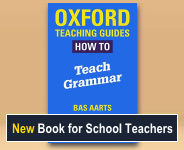Topics: Auxiliary verb or Determiner
Auxiliary verb
Auxiliary verbs are 'helping verbs', which always accompany the main verb...
Determiner
A determiner is a word like a, the or my which comes before a noun to help specify what or who it refers to, e.g...
Englicious contains many resources for English language in schools, but the vast majority of them require you to register and log in first. For more information, see What is Englicious?

